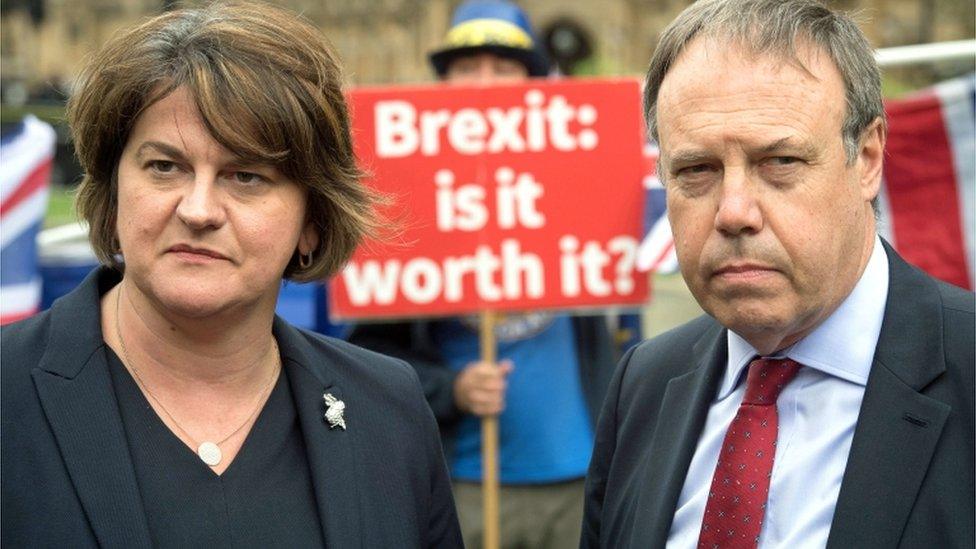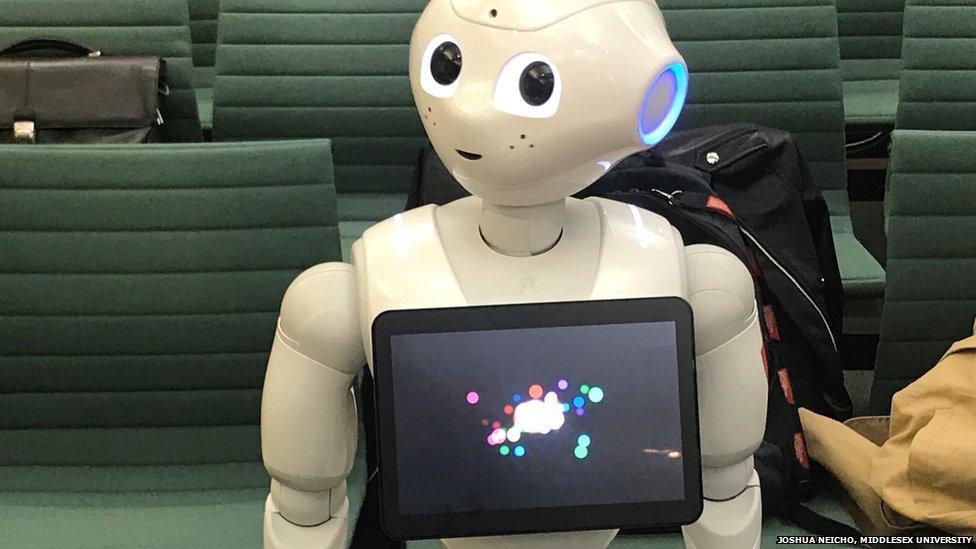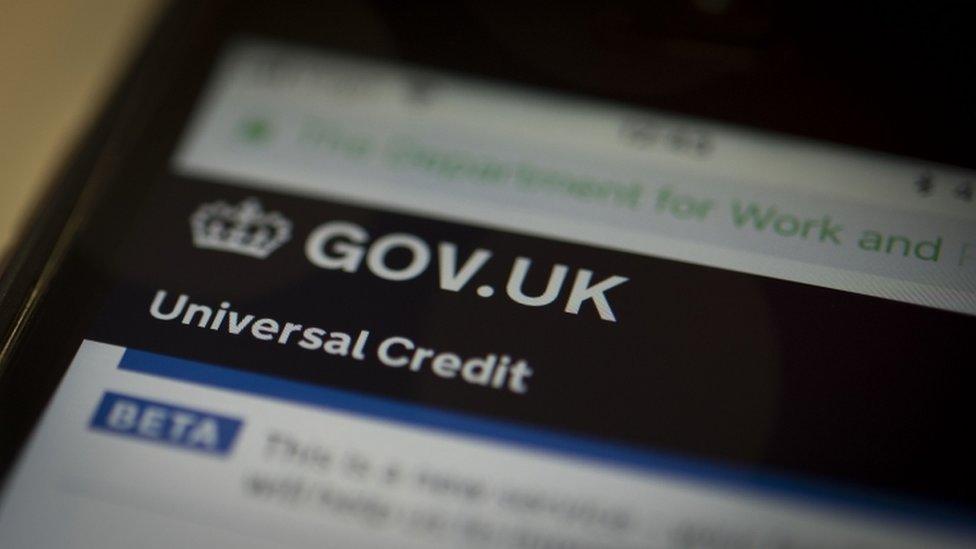Week ahead in Parliament
- Published
- comments

DUP leader Arlene Foster, and the DUP's leader at Westminster, Nigel Dodds, have been in negotiations with the government
Last week was a strange and ominous Westminster week, where the DUP delivered a warning crack of the whip to Theresa May, by failing to turn up for a vote on the Agriculture Bill.
No legislation was harmed in the making of their point - the bill got through second reading unscathed - but the message was delivered; they're really unhappy about a Brexit deal which could mean separate treatment for Northern Ireland, perhaps for a very long time.
And their unhappiness could resound through future Commons votes, on random statutory instruments, maybe on amendments to the Offensive Weapons Bill (see below) and maybe even on the Budget in a couple of weeks' time.
So one upshot of their Brexit discontents is that almost any humdrum piece of government business could provide the next opportunity to remind the PM that she depends on their votes. Because although the message was delivered, it is not clear that it has been fully received.
A lot of Conservatives don't believe that the DUP will set out on a course that could destabilise the government and maybe put Jeremy Corbyn, a lifelong supporter of a united Ireland, into Downing Street. Which means that the message might have to be resent a couple of times, before it hits home, if they truly mean it.
And one DUP source told me "the U in DUP stands for Unionist - it's not just branding". They believe their voters would turn on them if they accepted the kind of deal they believe the PM is now toying with.
So watch out for unexpected votes - and don't imagine the DUP would have any scruples about coordinating in advance with Labour and the other parties in the Commons.
In fact, the coming week's agenda does not seem to provide many opportunities for votes, but keep an eye on the DUP in any divisions that are held (and here the fantastic Commons Votes app is the must-have style accessory for parliamentary nerds everywhere).
The week will also see two big memorials for two senior Labour peers; for Josie Farrington, in Parliament on Tuesday, and for Tessa Jowell, at Southwark Cathedral on Thursday.
Monday 15 October
The Commons meets (2.30pm) for Work and Pensions questions - and then expect the usual clutch (I must try and thing of a better collective noun...) of post-weekend statements and urgent questions.
The day's main legislating is on the Offensive Weapons Bill, external - which aims to tackle the increase in knife and gun crimes well as acid attacks.
The bill will strengthen police powers to deal with them, and make it more difficult for young people to use acid as a weapon and to buy knives online. There are Labour amendments to create a specific crime of possession by people who are not registered firearms dealers of component parts of ammunition with the intent to manufacture.

And there are a couple of backbench Conservative amendments reflecting concern that the bill is over-restrictive on gun owners - one, from Sir Geoffrey Clifton-Brown would prevent a ban on rifles over 13,600 joules at the muzzle in England - a category that covers big .50 calibre sniper's rifles; and another would introduce a requirement for higher security measures, before someone obtains a firearms certificate for such a weapon.
Another amendment, from the Conservative, Philip Davies would mean that threatening with an offensive weapon anywhere would be an offence, not merely in a public place. There is a parallel amendment dealing with knives.
In Westminster Hall (4.30pm), there is a Petitions Committee debate on e-petition 211950, external, urging the government to set up an independent regulatory body "which will take meaningful action to stop horses dying".
The petition, which has more than 105,000 signatures, states that "around 200 horses die each year due to racing in Britain". The government has responded that it "does not consider that it is necessary to create a new body to protect racehorse welfare", but this will provide an opportunity for MPs to question a government minister directly.
On the committee corridor, the high-powered Committee on National Security (4.15 pm) ponders the national security risks of foreign investments in critical UK companies.
It was this kind of concern that led to the creation of an 'oversight board' to monitor the security of Huawei-supplied equipment in UK communications networks. This hearing will feed into the consultation on a government white paper with evidence about the risks from industry, experts and government officials.
A key issue will be the level of foreign ownership or control of UK assets that entail a security risk; which counties present an 'acquirer risk'; how national security will be balanced with the need to attract investment in the UK and any problems industry will have with the new systems.
In the Lords (2.30pm) peers continue their detailed scrutiny of the Mental Capacity (Amendment) Bill, external, where there is considerable concern about the safeguards around the deprivation of freedom and the proposed role for care home managers in decision-making.
But remember this is a committee stage debate, so at this point peers are probing the government's thinking; if they're not happy, amendments may be put to a vote at the later report stage.
The debate on the protection of property guardians led by the Green Party peer Baroness Jones of Moulsecoomb, raises an interesting issue: property guardians are usually young people living in buildings like schools or cinemas for a low rent.
They give property owners peace of mind while the property is vacant, at a much lower cost than hiring professional security and boarding the property up. But the Greater London Authority's Housing Committee has found that this practice has rapidly evolved and grown - now involving an estimated 5,000-7,000 people.
The issue is that they are living in a legal grey area without any of the legal protections contained in a conventional Tenancy Agreement.
Some guardians have been kicked out of the properties with only days notice, the buildings can be dangerous and unsuitable for habitation - the Fire Brigade have had to shut down some of the buildings occupied by guardians as they posed an immediate danger to life. The government has so far resisted calls to clarify the legal rights of property guardians, but there are signs that ministers are now focusing on the issue.
Tuesday 16 October
The Commons opens (11.30am) with Business, Energy and Industrial Strategy questions, after which Plaid Cymru's Hywel Williams proposes a Ten Minute Rule Bill on Cold Weather Payments - he wants to re-examine the way the weather data which triggers cold weather payments is gathered.
The main law-making is MPs' consideration of Lords amendments to the Rating (Property in Common Occupation) and Council Tax (Empty Dwellings) Bill, external.
MPs will also vote on a money resolution to fund the Overseas Electors Bill, external - a private member's bill, sponsored by the Conservative, Glyn Davies, which would end the 15-year time limit currently placed on overseas voters voting in UK Parliamentary elections.
The bill itself is pretty uncontroversial, but there are a few general sulks around the issue of the money resolutions for private members' bills, because the government is currently blocking such a resolution for the Labour MP Afzal Khan's bill to stop its plan to cut the size of the Commons. Might this be an opportunity for retaliation? Might the DUP join the fun?
Then there is another bit of Parliamentary arcana - Opposed Private Business (in this case the second reading of the University of London Bill). The Conservative MP Christopher Chope has a practice of refusing to allow private bills (that is bills relating to a private rather than public matter, not the same as private members' bills) to go through on the nod - he thinks Parliament should debate new laws, public or private, more thoroughly.... so after a bit of guerrilla warfare, the Chairman of Ways and Means, Deputy Speaker Lindsay Hoyle, has brought them to the floor of the House. It may all be over in a flash, but who knows?
One other thought is that the main business, as listed above, looks a bit thin. Perhaps something is going to be added to the agenda at short notice. Otherwise the Conservative MP and former nurse, Nadine Dorries would be wise to be on standby for an early start to her adjournment debate, on childhood obesity.
In Westminster Hall, the debates include: reducing stigma around eating disorders (9.30am); road safety (2.30pm) and housing and home ownership (4pm).

Pepper the Robot, visiting Parliament...
On the committee corridor, the stand-out event of the day is the appearance of the first ever cyber-witness, as Pepper the robot, from Middlesex University, appears before the Education Committee (10am) among a panel of witnesses talking about the Fourth Industrial Revolution, which is driven by robots and artificial intelligence, and has huge implications for the future of work.
The committee will hear about Pepper's work at Middlesex University, including a project involving teaching primary school children, and what role increased automation and robotics might play in the workplace and classroom of the future.
In the Lords (2.30pm), the main event is the report stage scrutiny of the Courts and Tribunals (Judiciary and Functions of Staff) Bill, external - where a vote is likely on a Labour amendment on their key objection to the bill: that it delegates legislative power to a politically unaccountable body, that is in turn responsible for delegating judicial functions to non-independent authorised persons.
To this end, the Labour amendment seeks to introduces a statutory right of judicial reconsideration of delegated functions. They will also press for minimum legal qualifications for authorised persons in non-judicial functions.
Then there's a relative rarity: a "regret motion" not moved by Labour's Lord Hunt of King's Heath. Instead, the Lib Dem ex-police chief Lord Paddick is taking up the cudgels against the Regulation of Investigatory Powers (Juveniles) (Amendment) Order 2018 - his complaint is that they increase the length of time a young person can be used as a covert human intelligence source from one month to four.
The Lib Dems are unconvinced by the government's reasoning, so the aim of the regret motion is to force the Home Office to explain its reasoning in more detail - and they may force a vote if they remain unconvinced, in the knowledge that there is also concern across the House. I'm told there will be meetings with ministers before the debate.
Wednesday 17 October
MPs kick off (11.30 am) with Scotland questions, followed at Noon by Prime Minister's Questions.
The day's Ten Minute Rule Bill, from Scottish Conservative Paul Masterton is an attempt to prod the government to legislate to allow a new breed of pension schemes - Collective Defined Contribution Pension Schemes.
This has come about because the Royal Mail is about to follow the example of many other organisations and end its existing defined benefit scheme - but would like, with union support, to move to a Collective Defined Contribution Scheme, which would be a bit more generous than existing defined contribution schemes. New laws would be needed, however, and this is an attempt to elicit some response to the idea, from ministers.

The main debates are on two Labour motions on Universal Credit and then on social care funding.
In Westminster Hall, debates include: local government reform in London (9.30am); privatisation of GP extended access services in Stockton, Hartlepool and Darlington (11am); East coast main line investment (2.30pm); prisons education and employment strategy (4pm) and the financial effect of absence from work due to mental health problems (4.30pm).
On the committee corridor, the Environment, Food and Rural Affairs Committee (9.30am) is launching into its scrutiny of the Agriculture Bill - Michael Gove's landmark reshaping of the farm subsidy system for the post Brexit era.
And the Women and Equalities Committee (9.50am) will take evidence on inequalities facing the Gypsy, Roma and traveller communities - witnesses include officials from the Human Rights Commission and police officers from the intriguingly titled "Operation Liberal".
In the Lords (3pm), peers debate a report from the EU Committee on Dispute resolution and enforcement after Brexit, external - this focuses on post Brexit system of enforcement, dispute resolution and the role of the European Court of Justice. Both David Davis and Michel Barnier have acknowledged that this remains one of the big unresolved issues around Brexit.
That is followed by a debate on religious intolerance and prejudice in the UK.
Thursday 18 October
The Commons opens (9.30 am) with Environment, Food and Rural Affairs questions, followed (from 10.10am) by mini-question times for the MPs who speak for the Church Commissioners, House of Commons Commission, Public Accounts Commission and Speaker's Committee on the Electoral Commission. Then comes the weekly Business statement from the Leader of the House, Andrea Leadsom.
The main debates, both selected by the Backbench Business Committee, are - first - on a motion on ending exploitation in supermarket supply chains, which is part of a broad push for tougher action against modern slavery in Britain and abroad; and then a general debate on World Menopause Day 2018.
In the Lords (11am), the main debates are on the scale and complexity of cyber threats facing the UK and the state of music education in schools.
Neither House sits on Friday 19 October
